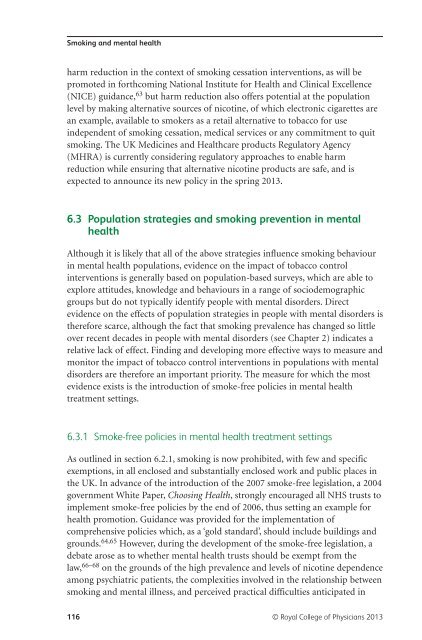Smoking and mental health - NCSCT
Smoking and mental health - NCSCT
Smoking and mental health - NCSCT
You also want an ePaper? Increase the reach of your titles
YUMPU automatically turns print PDFs into web optimized ePapers that Google loves.
<strong>Smoking</strong> <strong>and</strong> <strong>mental</strong> <strong>health</strong><br />
harm reduction in the context of smoking cessation interventions, as will be<br />
promoted in forthcoming National Institute for Health <strong>and</strong> Clinical Excellence<br />
(NICE) guidance, 63 but harm reduction also offers potential at the population<br />
level by making alternative sources of nicotine, of which electronic cigarettes are<br />
an example, available to smokers as a retail alternative to tobacco for use<br />
independent of smoking cessation, medical services or any commitment to quit<br />
smoking. The UK Medicines <strong>and</strong> Healthcare products Regulatory Agency<br />
(MHRA) is currently considering regulatory approaches to enable harm<br />
reduction while ensuring that alternative nicotine products are safe, <strong>and</strong> is<br />
expected to announce its new policy in the spring 2013.<br />
6.3 Population strategies <strong>and</strong> smoking prevention in <strong>mental</strong><br />
<strong>health</strong><br />
Although it is likely that all of the above strategies influence smoking behaviour<br />
in <strong>mental</strong> <strong>health</strong> populations, evidence on the impact of tobacco control<br />
interventions is generally based on population-based surveys, which are able to<br />
explore attitudes, knowledge <strong>and</strong> behaviours in a range of sociodemographic<br />
groups but do not typically identify people with <strong>mental</strong> disorders. Direct<br />
evidence on the effects of population strategies in people with <strong>mental</strong> disorders is<br />
therefore scarce, although the fact that smoking prevalence has changed so little<br />
over recent decades in people with <strong>mental</strong> disorders (see Chapter 2) indicates a<br />
relative lack of effect. Finding <strong>and</strong> developing more effective ways to measure <strong>and</strong><br />
monitor the impact of tobacco control interventions in populations with <strong>mental</strong><br />
disorders are therefore an important priority. The measure for which the most<br />
evidence exists is the introduction of smoke-free policies in <strong>mental</strong> <strong>health</strong><br />
treatment settings.<br />
6.3.1 Smoke-free policies in <strong>mental</strong> <strong>health</strong> treatment settings<br />
As outlined in section 6.2.1, smoking is now prohibited, with few <strong>and</strong> specific<br />
exemptions, in all enclosed <strong>and</strong> substantially enclosed work <strong>and</strong> public places in<br />
the UK. In advance of the introduction of the 2007 smoke-free legislation, a 2004<br />
government White Paper, Choosing Health, strongly encouraged all NHS trusts to<br />
implement smoke-free policies by the end of 2006, thus setting an example for<br />
<strong>health</strong> promotion. Guidance was provided for the implementation of<br />
comprehensive policies which, as a ‘gold st<strong>and</strong>ard’, should include buildings <strong>and</strong><br />
grounds. 64,65 However, during the development of the smoke-free legislation, a<br />
debate arose as to whether <strong>mental</strong> <strong>health</strong> trusts should be exempt from the<br />
law, 66–68 on the grounds of the high prevalence <strong>and</strong> levels of nicotine dependence<br />
among psychiatric patients, the complexities involved in the relationship between<br />
smoking <strong>and</strong> <strong>mental</strong> illness, <strong>and</strong> perceived practical difficulties anticipated in<br />
116 © Royal College of Physicians 2013














